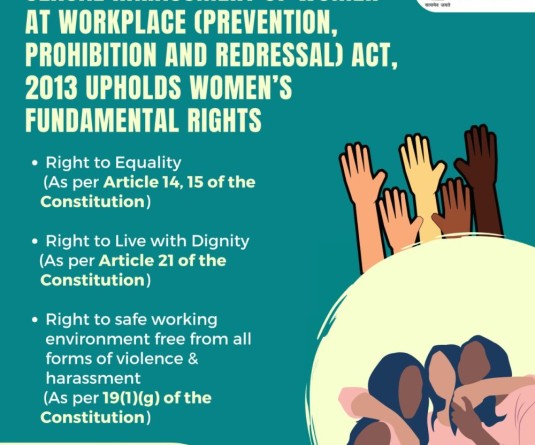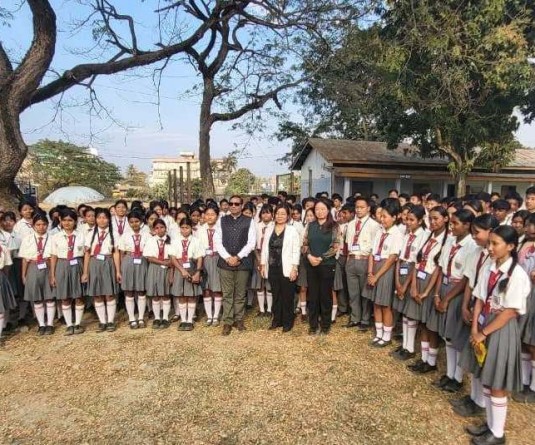Dr Shürhozelie Liezietsu, President of Ura Academy (4th from Left), members of Writers Collective, authors and others seen during the 4th edition of Nagaland Literature Festival held at Capital Cultural Hall Complex in Kohima on November 13.
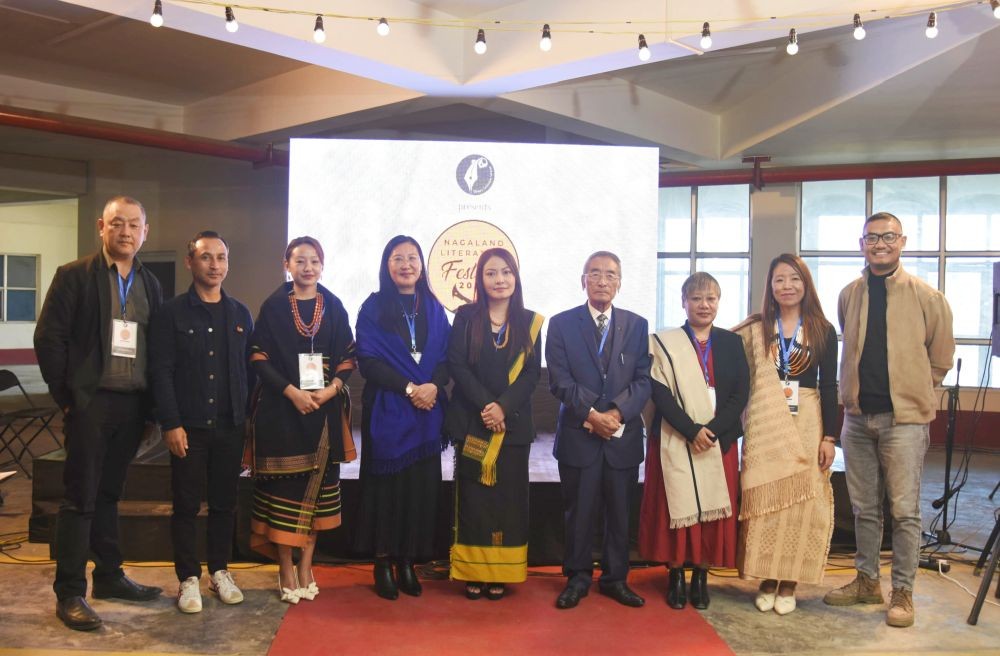
4th Edition of Nagaland Literature Festival held
Morung Express News
Kohima | November 13
Recalling that education reached Nagas very late, Dr Shürhozelie Liezietsu, President of Ura Academy stated that “the first American Baptist Missionary, Rev Clark made inroad into Naga soil only in 1872 and the first formal School was founded by his lady wife, Mary Mead Clark only in 1878.”
Addressing the 4th edition of Nagaland Literature Festival at Capital Cultural Hall Complex Kohima on November 13, he shared that during the Second World War, also called the Japanese invasion, Kohima was reduced to ashes. “Little literature that we might have during that time were completely destroyed”, he remarked while stating that “those days, our literature was mostly confined to mission centres” and that if there are some old literature today, it was because many of those were brought back from the mission centres like Guwahati, Shillong or Kolkata.
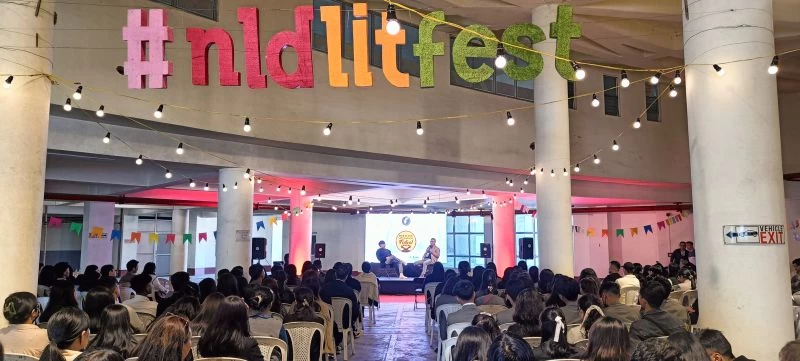
Then again, in the fifties, he said that, “the Indo-Naga war started again before we could rise up from the Second World War shock”. In Kohima, he said, all their houses were destroyed once again destroying few literature that they had. In this context, he also remarked that, “we are yet to see the light at the other side of the tunnel as far as the Naga political problem is concerned” while adding that “Literature cannot thrive under disturbed condition.”
Stating that our people faced serious challenges in this particular field, he stated that however slow the spread of education might be, “the progress made by the younger Naga generation is really laudable.”
He expressed pride to see “the good progress made by our younger generation particularly in the literary field” while also stating appreciation for Writers Collective in this regard. Based on this year's theme, “Amplifying Our Indigenous Voices”, he exuded hope that it would further explore preservation and promotion of Naga languages and stories, the role of storytelling in Naga culture-personal experiences, challenges faced by our writers and artists, oral stories and legends as inspiration for written works, social commentary through creating storytelling new ways of engaging and promoting our languages and literature, impact of social media and navigating through modern innovations.
Abeinuo Jasmine Ashao, SDO (Civil) Kohima spoke on “The Indigenous Woman Voice: A Perspective” wherein she highlighted that “our society often takes pride that our women share the same rights as men and enjoy a comparatively better position than women in other communities. That we make no distinction between a man and a woman.”
However, she noted that “owing to many factors, patriarchal, patrilineal and patrilocal influence being paramount, gender discrimination is systematically practiced and greatly legalised by tradition and customary practices.”
Citing instances and references, she also emphasised that, “It is time to change the narrative, to dare and make the voice of the Naga indigenous woman heard and help break the social shackles that had long made the Naga women forget her strength.”
'Our indigenous voices matter and will remain relevant’
In her opening remarks, Vishü Rita Krocha of Writers Collective said that the 4th edition of Nagaland Literature Festival marks a new chapter, having moved away from the Hornbill list of events. Despite the many challenges in mobilising resources for the 4th edition, she said that holding the event independently would have more meaning and impact.
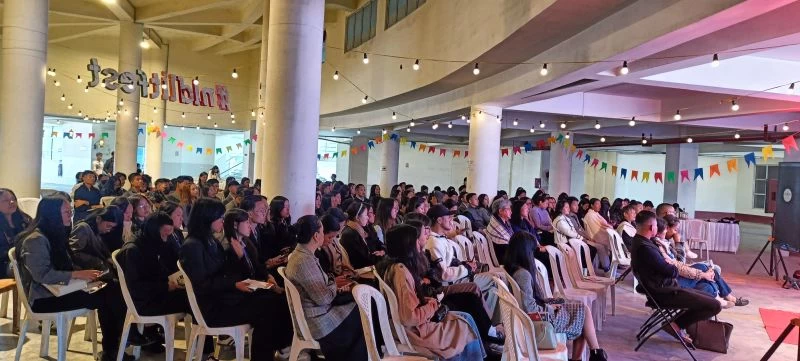
In the meantime, she recalled that it was the idea of Abu Metha, Advisor to the chief minister of Nagaland, who laid the foundation for the first edition of the Nagaland Literature Festival for which, she expressed gratitude on behalf of Writers Collective.
Regardless of literature generally not being considered as an important area for community development and the growth and progress of a society, she reiterated that “Writers Collective will endeavour to promote literature from the state of Nagaland that has always been brimming with stories.”
Since its inception, she underscored that its primary focus has been that of making and keeping our local stories relevant while asserting that “our indigenous voices matter.”
“In our search for self-discovery, our stories are the basis of our foundation, our roots, our identity, our history and our culture. And therefore, it is important that we learn, understand, and embrace our stories before we begin to explore stories from the outside world”, she underlined.
Stating that Nagas are inherent storytellers, she said the Literature event was meant “to amplify that voice and to spark that light in the hearts of young people and for them to pursue with vigour, and tell our stories.”
She also exuded hope that everyone would be enriched by the 4th Edition of Nagaland Literature Festival 2024. “May our stories travel far”, she further expressed.
During the inaugural programme, Rev. Kedo Peseyie said the prayer while Mhasheseno Hibo presented a special number.
The event was marked by a conversation on “Storytelling: From Text to Screen” between Joe Rutsa and Sentilong Ozukum while a panel discussion on the theme “Amplifying Our Indigenous Voices” was held with Inakali Assumi, Jungmayangla Longkumer, Moko Koza, and Megosano Sakhrie as panelists and Theyiesinuo Keditsu as the moderator.
Storytelling with children from Bumblebee School and Stella Higher Secondary School was also held with Children's book authors, Kevi Z. Kevichusa and Molona Wati Longchar. A book writing workshop titled, “Journey of a book” was also conducted by Neikehienuo Mepfhuo, Vizovono Elizabeth and Vishü Rita Krocha for school students under Beti Bachao Beti Padhao. During this session, Moasunep K Jingru, EAC (Dev) Kohima also gave a short note on “Beti Bachao Beti Padhao”.
As part of the Nagaland Literature Festival, Open Mic for poetry, storytelling and singing was also held featuring Tialila Kikon, Emisenla Jamir and Atiro Kiho wherein Runshito Lims was the host.
The closing programme was graced by Kevileno Sakhrie, Academic, Educator, & former HOD, English Department, Kohima College Kohima as the special guest. Vizovono Elizabeth gave the way forward during the programme while Vikiyeto Noel Jimomi said the prayer and Sevotsonü Sale, Imtikumzuk Longkumer and Lemba Arambam presented special number. Kevilenuo Miachieo was the host for all the four editions of Nagaland Literature Festival.




